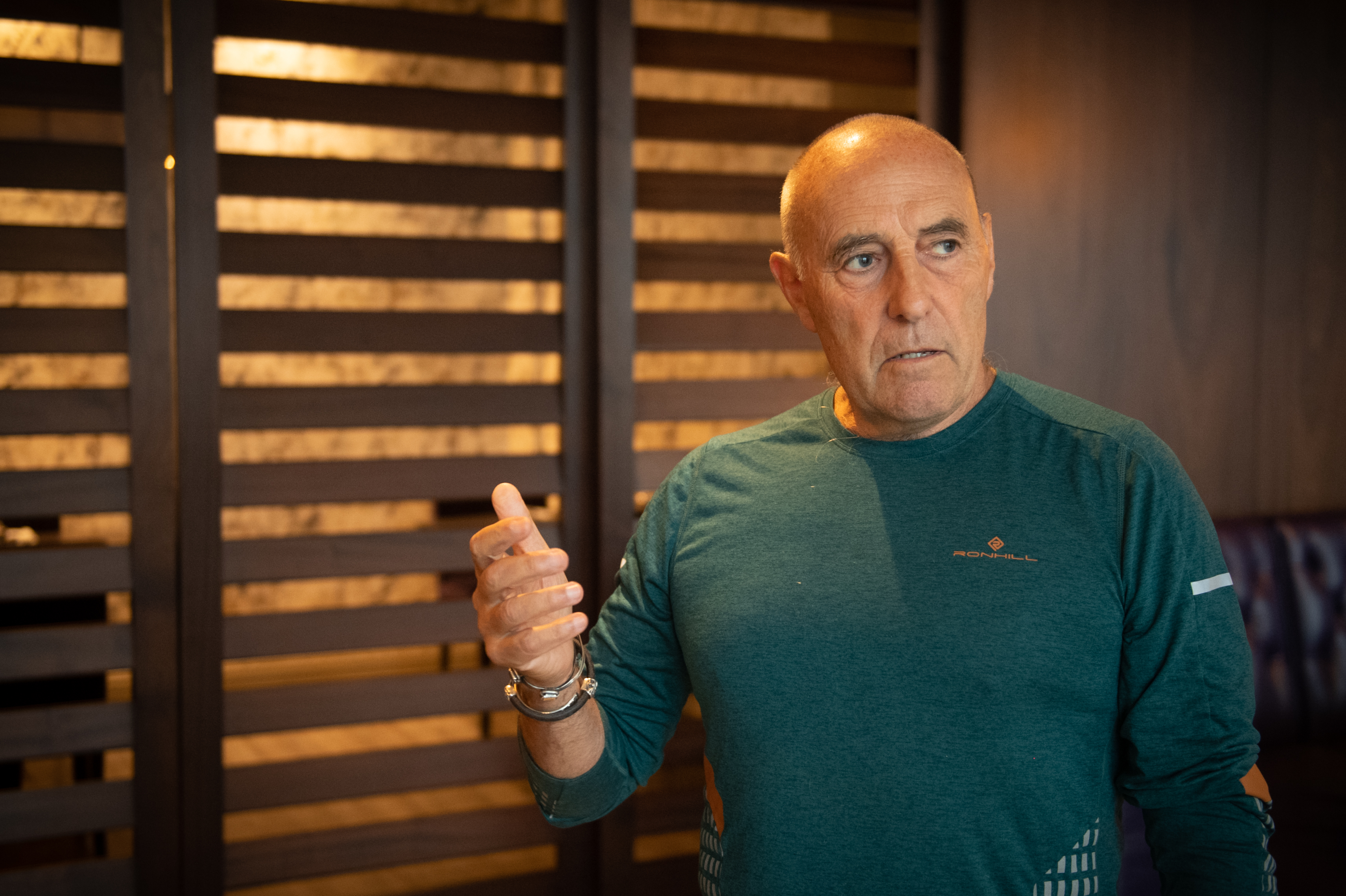


Lieutenant General Sir Graeme Cameron Maxwell Lamb, KBE, CMG, DSO, is a retired British Army officer with a distinguished military career that spanned over four decades.
Known for his expertise in counter-insurgency and strategic operations, he played a pivotal role in shaping military strategy during some of the most complex conflicts of recent times, including Iraq and Afghanistan.
As the former Director of Special Forces and Commander of the British Field Army, Sir Graeme’s experience in high-stakes leadership and decision-making has given him unique insights into navigating uncertainty, managing risk, and executing strategic initiatives under pressure.
In his post-military career, he has become an influential speaker and advisor, sharing his expertise on leadership, crisis management, and the importance of decisive action.
As the conflict between Ukraine and Russia continues to escalate, amid other geopolitical uncertainty, he shared some important lessons for Jersey in today’s unpredictable world – not least, if you think you’re prepared, you probably aren’t...
Good question. Good question, what’s the biggest threat no one has seen?
In 2014, I was asked the same question, ‘What do you think the biggest threat in Europe is or will be?’ with a US Think Tank, and I said, migration. Two years later, everybody turned around and said, 'Graham, where do you see this one coming from?’ And I just said, ‘It was in plain sight.’
So today, I can see two or three spaces that are not so obvious, but they should be. The first is digital dependence.We are horribly digitally dependent.
If you take something like the internet and the undersea cables, you take satellites and that connectivity, if you take those two parts out of the equation, global economy, finance just stops right in a heartbeat.
The second would probably be us losing our determination for our nation to continue to support Ukraine.
Picking up on your first point, as far as our digital dependence goes, it’s something that's changed since 2001, it has increased exponentially…
Off the chart. I was taught astral navigation, so I'm old enough to recognise that. You learned the sun compass and the sort of mechanics of navigation, long before GPS. Even when GPS first arrived, it was secondary to the physical charts and the other associated paraphernalia that came with navigating.
Knowing what you do now about the ‘digital age’, would that have changed your approach as Director of Special Forces in any way? I imagine it may be harder to have a covert operation in 2024 than it was back in 2004.
It’s not the strongest and the most intelligent of the species that survives, it's the species that adapts, and so adapting to the changing reality is really important keeping ahead, and not hanging brutally onto the simplicity of what you did, the comfort of what you did and how you did it. Complacency is a death knell to any good soldier.
I think it's also probably the death knell to a really good business. You know, Kodak had digital cameras. They had worked out the pixel and the digital space, and yet they were so good with film, they stayed with it. [Now it’s] gone.
Bad behaviour begets bad behavior. We've seen a consistency in President Putin's approach, whether it was Georgia, here in UK with Salisbury, and then obviously Ukraine in 2022. There’s been a consistency – look at Crimea 2014.
This is not as if we haven’t been given the signals of bad behaviour. What we didn't do was challenge them really effectively, other than just strong words and a stiff upper lip. As a result, therefore, if you're a bully, you push, and you can push.
I think Bismarck once said, ‘If you find mush, you push. If you find flesh, keep pushing. If you find steel, stop.’ It’s the same effect –you have to draw a line. Not by only words, but by deeds – they underpin that resolution, that determination.
I find it extraordinary that you asked me that question. Why? Of course, I mean, seriously, of course.

Pictured: Lieutenant General Sir Graeme Cameron Maxwell Lamb, KBE, CMG, DSO is a former Director of Special Forces
I think it'sprobably somethingthat's already taken place, is taking place and will continue to take place. I have no doubt whatsoever. Jersey is a financial attractive space that sits in part of the sort of Western financial architecture.
One of the dangers of today is that, because of the explosion, the acceleration of the explosion, the acceleration of converging technology – so AI, ML, big data – and the ability to have it stable and manageable means that that everything now can be done, whether you're a government interested in Jersey, whether you're a government interested in an individual in Jersey or a company in Jersey, whether you're a criminal organisation interested in Jersey, in a company in Jersey into an individual in Jersey, if you're looking to shape the market change, the dynamics present an opportunity.
Of course Jersey’s a target.
I think it would be wrong to take a sort of a fortress position. In many ways, people are interested in you because of your ability to manage finance, to move money, to be part of a broader international financial and business commercial proposition, so you don't want to shut that down. You just need to exploit it to your advantage.
It would depend upon the nature of the attack. So take the example of Wannacry, which was the North Korean ransomware that hit the NHS 2016. I think the damage was £92 million. That's not an insignificant amount of money, but it never intended to really hit the NHS – this was just a cyber tool that that just found its way to and through weak, non-observed, non-compliant, not-up-to-date scenes.
Now, it’s your telephone, Alexa, you can just keep ticking off the list of all the systems that allow you an access point. Don’t get me wrong, I’m anything but a technology luddite – in fact, I think it will probably save us from ourselves. I'll go to my grave disappointed in humanity, but the one thing that might save us because we're really stuck on ‘stupid’ is technology.
Take with covid – in less than a calendar year, there were six, credible, usable, viable vaccines which couldn’t have been done.
No one should go up onto the stage for a Nobel scientific prize without his or her computer in their hand and say, ‘myself and Apple…’ or ‘myself and IBM would like to thank the noble institution for this award’ – because they couldn't have done it without that.
All of the above. I never sleep well, but I never sleep badly, so nothing keeps me awake, but you know what? What would be that thing? Digital dependence.
Look at the range of conversations that have been taking place recently, the head of MI5 [speaking about the threat of online propaganda showing a canny understanding of online culture], between the head of MI6 and the CIA, and the BBC the other day talking about the threat of propaganda when we were losing the world service.
They might say that was our form of influencing a world view – there was a degree of honest truth in what the BBC was saying. Take it away, propaganda is what you’re going to get. You’re going to be presented with bias.
Take Hitler, hecouldn't have gone to war in the 1930s had he not prepared the nation in the 1920s with the Ministry of Information. They used to say that one in five directives that came out of the Ministry of Information were on what not to say – because propaganda is not deceit and deception, it’s not untruth. It's a limited truth, a truth taken out of context, which gives it credibility.
I'm pretty confident that this is a conversation that will have taken place in Jersey, at all sorts of levels and in all sorts of places already. People would have looked and reviewed their systems.
Tempus fugit. Time is already running. If at any point in time you think you’ve got this, you haven’t.
This article first appeared in the November edition of Connect magazine – pick up a copy around the island or read the digital edition in full below...
Comments
Comments on this story express the views of the commentator only, not Bailiwick Publishing. We are unable to guarantee the accuracy of any of those comments.